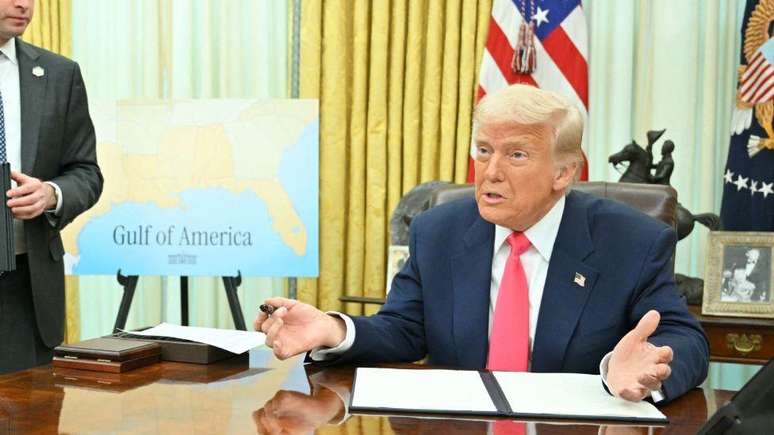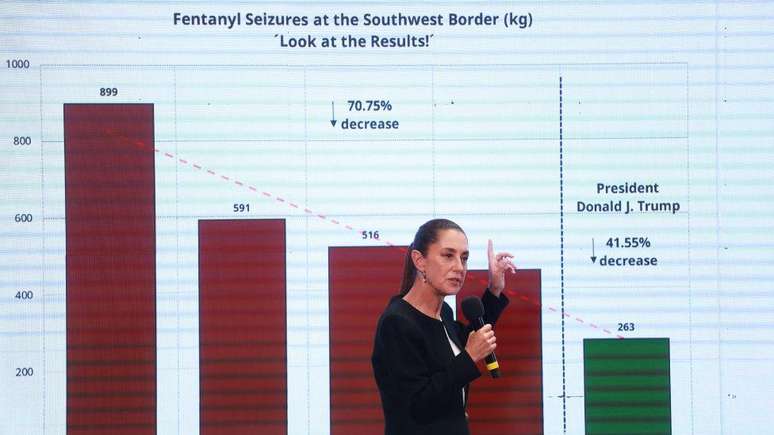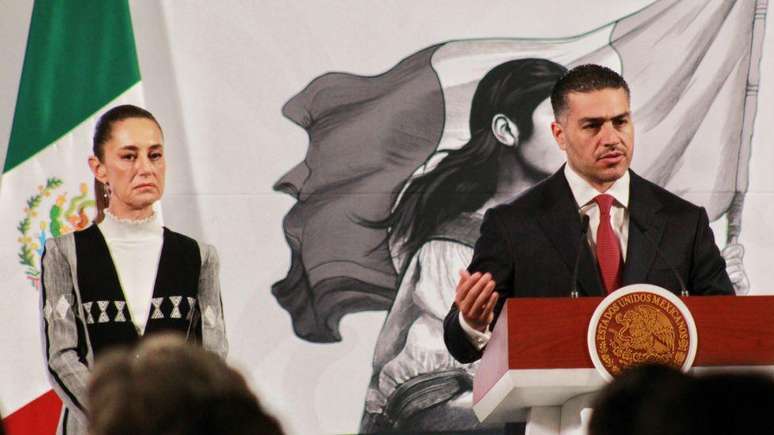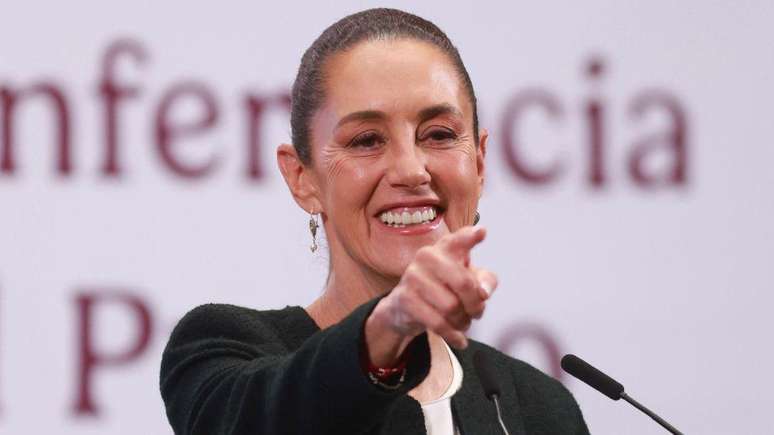Claudia Sheinbaum has been able to contain not only the impact of Trump’s policies, but also transform them into opportunities.
When Donald Trump was elected president of the United States in November, many warned that Mexico would be one of the most affected countries. Some even said it would be “the most affected”.
The republican protectionist economic agenda and the hard line in safety and migration seemed a sort of condemnation to a country that in these areas and many others depends on Washington’s interests.
And while Mexico remains vulnerable to its powerful northern neighbor, the president of the country Claudia Sheinbaum has reached at least so far, not only contains the impact of Trump’s policies, but also transforming them into opportunities.
Thursday (6/3), the two leaders came to a new agreement to suspend US taxes for Mexican exports, Sheinbaum’s priority and work together to combat Fenanil trafficking and illegal migration, Trump’s great obsessions.
“Our relationship was very good and we are working hard on the border (…) thanks to President Sheinbaum for his hard work and his cooperation,” Trump wrote.
And Sheinbaum replied: “We had an excellent and respectful phone call, in which we agreed that our work and our collaboration produced unprecedented results”.
The differences between Trump and Sheinbaum are remarkable: he is conservative, of strong masculinity, criticism of science, unpredictable and disruptive in politicians and speeches; On the other hand, she is feminist, moderate, scientific and attentive in methods, words and public policies.
They are different, antagonists, but positive adjectives are constantly repeated in their statements: “I have great respect for this”; “It should be noted that the treatment was very respectful,” said Trump.
How did Sheinbaum, whose popularity has risen to 85% unprecedented among the Mexicans, managed to transform what has so far seemed a perfect storm into an opportunity?

From the Town Hall to the Presidency
Much is due to its security strategy, which, although it does not declare, is distinct from that of its predecessor, Andrés Manuel López Obrador, founder and symbolic leader of the political movement they share.
Amlo, as is known in Mexico, had a “humanist” policy regarding the growing wave of violence in the country: he has privileged social investments to prevent young people from entering the crime and reducing the persecution of armed groups to prevent further deaths.
At a certain point, he defined the policy “hugs, not bullets” to mark the difference compared to previous governments which, partially supported by the United States, have adopted a military approach to the so called “drug war”, which led to violations of human rights in Mexico.
Sheinbaum, of course, does not criticize or move away from this line. In his declaration on Thursday, he insisted that part of his goal is to face the causes of violence.
But even before becoming president, he was already known to have a different interpretation from crime. When he was mayor of Mexico, between 2018 and 2023, he strengthened the police, he created sophisticated coordination networks between the authorities, put cameras around every corner and convinced citizens that the relationships were primordial.
As a result, the incidence of the crimes was reduced by 58%and intentional murders of 51%, according to official data.
His idea is to replicate the city’s experience in the presidency. To this end, he put Omar García Harfuch, a former police and the military son, in front of the Security Secretariat, a position he held at the municipal level.
And it seems that, despite the prevalence of violence, its strategy is producing fruits: the murders throughout the country decreased by 16%, dozens of tons of Fenanils were seized, several workshops of the dangerous Oppioid were destroyed and large drug trafficking heads were destroyed.
Last week, the Mexican government extradited 29 of the most sought after criminals in the world in a “transfer” that caused controversy and showed Sheinbaum’s pragmatism in what has been interpreted as a nod for Trump. At the same time, as the president said, there were progress in the fight against crime.

‘The problem is chronic’
But violence, of course, remains daily in Mexico. The progress and statistics say nothing about the problem below, says Ernesto López Portillo, coordinator of the citizens’ security program at the University of Ibero -American in Mexico, BBC News World, Spanish news service at the BBC.
“Sheinbaum has radically changed the security policy of the previous president, despite being the same party,” he explains.
“Amlo has accepted, or at least tolerated, the growing influence of criminal organizations across the country (…) Mexico has a chronic problem of impunity, extortion, disappearances and nothing that the president can solve it quickly.”
“Trump’s pressure causes Mexico to have results in terms of arrests and drug flow, but we do not know if this implies the strengthening of the institutions or if it is a temporary question of the results”, adds López Portillo.
Sheinbaum rises to power three months before Trump. That is, before the rates, the variation of Mexican security policy arrived. Only now Sheinbaum doubled the bet.
“We do this work for Mexico’s security,” said the president Thursday. “It is part of our safety strategy and our cooperation in the United States.”
It is as if Sheinbaum was trying to kill two rabbits with a stone.
“The security policy is strengthened and accelerated by the pressure of the United States, but it is not exclusively a reaction,” says Guadalupe González, specialist in international relations at the College of Mexico (Colmex), a Mexican higher institute of education aimed at studying human and social sciences.
“And as regards the economy it is similar,” he adds. “The strategy is to convince the United States that to recover their competitiveness and strengthen their sector, they need Mexico”.
Perhaps, therefore, there are three rabbits with a stone in the case of Sheinbaum.

‘We too
In January, when Trump was about to enter office, the president presented, accompanied by the private sector, a plan of economic development to expand the country’s production system, attract investments, support medium -sized companies, reduce bureaucracy to entrepreneurship and strengthen tourism.
A plan of economic development that, in other words, tries to depend less on the United States.
Or, as Sheinbaum said on Thursday: “We strengthen our energy sovereignty. We must strengthen our self -sufficiency (…) we must also review our treaties”.
The renegotiation of T-Mec, the crucial free trade agreement between Mexico, Canada and the United States, is scheduled for 2026. That for Trump seems to be the ideal excuse for the largest country to subjugate the two smallest, can become, according to the president, another opportunity for Mexico.

‘Let’s celebrate’
In his statements, Sheinbaum insists that “cooperation is not subordination” and “treatment is equal”.
Tuesday, when Trump imposed the rates, the president said he would announce response measures in a great event in Zócalo, the emblematic square in the center of the capital.
The rates have now been suspended, but the event is still standing:
“We will have a festival, we will celebrate the achievement of this agreement and invite the musical groups to celebrate,” announced the president with a smile on Thursday.
“Come, compatriots, come that we embrace you, you are the best that our country has,” he added, referring to the farmers who had already planned to participate in the event in the capital.
As if that were not enough to have the support of 8 out of 10 Mexicans, Sheinbaum will double the nationalist bet. Perhaps, therefore, there are four rabbits that he is trying to kill with a stone before Trump’s threat.
Source: Terra
Rose James is a Gossipify movie and series reviewer known for her in-depth analysis and unique perspective on the latest releases. With a background in film studies, she provides engaging and informative reviews, and keeps readers up to date with industry trends and emerging talents.






